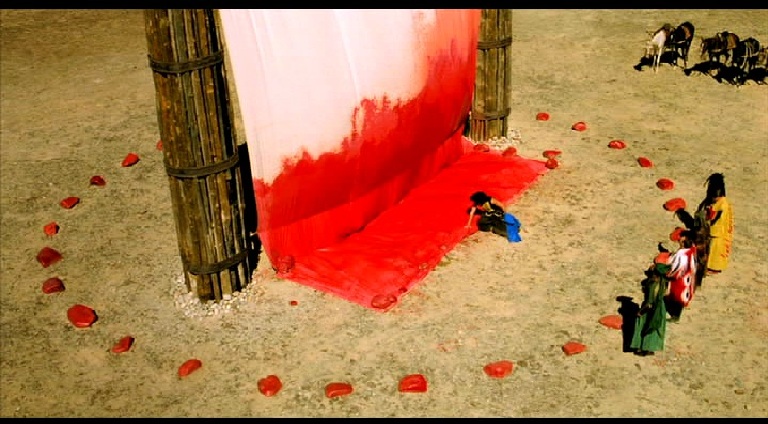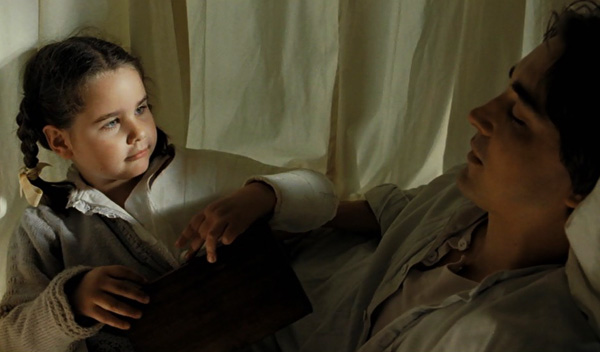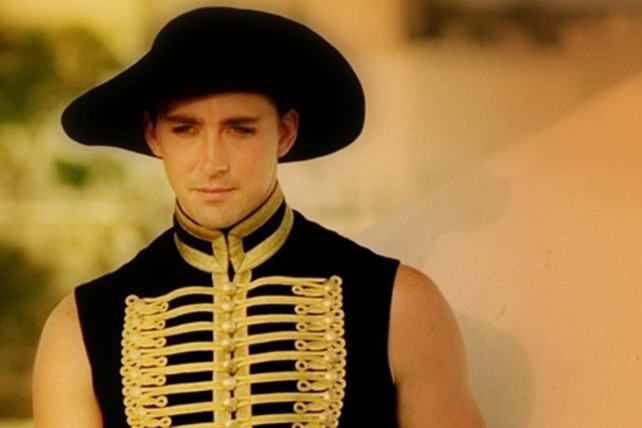The Fall Movie Deep Dive Discussion and Explanation
There have been a few of you recommending that I get off my ass and review this movie entitled The Fall for a while now. Some of you have been more persistent than others. And to you I tip my hat. Because this definitely was a fantastic (both in the literal and figurative sense of the word) little movie. A multifaceted movie with layers upon layers of potential meaning and epiphanies if you are hard working enough and diligent enough to uncover them.
Here at THiNC. I have tried my best to find the movies that buck the trend of Hollywood today. Movies that instead of feeding us pre-masticated pastiches of stories already told, and retold, from previous successful attempts, but rather, new, and innovative ideas that push back against this tide. Here at THiNC. we like movies that make us think, (I know, see what I did there? So clever. (I sometimes get people asking me what THiNC. stands for and I just chuckle to myself a bit. And if you are one of those, and you don’t know, don’t worry, make it mean whatever you prefer it to mean. Tyrannosauruses Hates Insidious Neanderthal Cowards. Because that actually makes more sense than what I originally intended.)) movies that push us outside of the normal cookie cutter entertainments that we are generally offered. And today? The Fall will be that movie.
The Fall Quick Spoiler-free Overview
If you haven’t had a chance to experience The Fall yet, just trust us and watch this amazingly beautiful, and deceptively simple seeming cinematic experience. But if you’d like to know just a bit more about it before you watch (which, you can do here, here or here) I can give you a brief overview. The story is about a young girl, Alexandria, who is in the hospital after falling from a tree, while picking oranges. It is also the story of Roy, a silent film stunt man, who is injured while jumping from a bridge. And while in the hospital together, the two of them hit it off, and Roy begins to tell Alexandria a story of five heroes and their adventures. But, as the story advances, it becomes more and more clear that the line between reality and fiction is blurring quickly. And maybe the mythic and virtuous tale isn’t all that mythic nor virtuous as it first seemed. Right? I sold you? You are now intrigued, and salivating. Brilliant. Now, go watch it. And leave – then, when you are done, come back to the handy bookmark you have saved in your browser. (I am so full service for you guys I can’t even stand myself.)
A Deeper Dive Into The Fall Explained
Alright. With the non Fall viewers gone – we can get down to the real business that is The Fall.
The movie kicks off in 1915 Los Angeles. Roy Walker (played by Lee Pace) is hospitalized after a controversial and dangerous stunt leaves him possibly paralyzed. He meets Alexandria (Catinca Unatru), a young girl with a broken arm who has fallen from an orange tree. And in their initial meeting, Roy begins telling Alexandria a story of her namesake, Alexander the Great.
The story that Roy begins to tell is a fantastical fairy tale of a story meant to distract the young girl of her current situation. The tale is a story of five different men: an Indian warrior with a penchant for eyebrow stroking, an ex-slave named Otta Benga, Charles Darwin and his pet monkey, an Italian bomb maker Luigi, and last but not least is the masked man who is our swashbuckling pirate hero. All five are united in a unique and different disdain for Governor Odious. Each offense by Odious is personal to all five of our heroes and they will die before they fail in their quest for vengeance.
As the movie seesaws its way back and forth between 1915’s L.A. and our Odious hunters we begin to realize that Roy might not be all charm and giggles. You see, he has problems of his own happening here in the real world. You see, he’s a stuntman after all, and without usable legs what is it exactly that he’ll do with himself? I mean really? A legless stuntman he thinks?!? This is so tense for Roy, that he is arguing and debating with the movie company about settling the claim. Worse? The woman he loved has left him for the man that Roy did the stunt for. So really? How can this go further pear-shaped than it already has? Unknown to anyone else, Roy is secretly harboring designs on suicide as his only real solution to the problems he sees before him.
But how is a paralyzed stuntman going to go about killing himself? Simple. Roy convinces Alexandria to steal the m-o-r-p-h-i-n-e from the hospital’s pharmacy. The glitch? Alexandria misunderstands the final E as a 3 and brings him three morphine pills instead of the whole bottle like he’d asked. But don’t worry, he soon convinces Alexandria to steal the morphine from a fellow patient’s cabinet and quickly kicks them all back. But surprise! The patient happened to be getting placebos apparently…and now everything is going 100% wrong for our (in)trepid storyteller.
Worse? Alexandria, in an effort to make Roy happy, and to get him to finish the telling of the story, runs back to the pharmacy, climbs up to the top shelf, in order to grab the bottle of morphine for Roy. Obviously she has zero idea as to what it is that he is wanting to do. Or why. But as she reaches the morphine, she falls and cracks her head as a result.
The Epic Fantasy Morphs As It’s Told
One of the most interesting aspects of this movie, and the story within the story, is that it is constantly changing, twisting and morphing. Why? Because it is ultimately Alexandria’s eyes that we see the movie through. It isn’t Roy’s telling that we view, but Alexandria’s imagining of the story that Roy is telling.
The swashbuckling leader of the five bandits? He morphs from a father, to Roy, to Roy as Alexandria’s father in the story. The characters of the story in the hospital are interwoven into the details of Roy’s narrated epic. The timeline, the rules, the goal lines of the story shift dramatically as the movie continues. This will be an enormously significant detail as we step back to try and understand the larger meaning of The Fall. But trust me, we’ll get to that in due time.
An Author’s Debt To His Readers
So here we are with Alexandria cracking her head – surgery as a result, and the story still not finished. We also have Roy failing to end his own life. And though he wasn’t successful at that endeavor, he won’t be unsuccessful in ending his story. Of this he’s sure. He’s decided it needs to meet the fate he was hoping to end – himself. So he begins killing each of the heroes one by one and apparently Governor Odious is going to win the day. Only the masked man and Alexandria’s character have survived Odious’ onslaught. And at this moment, a very interesting exchange happens:
Alexandria, “Don’t kill him.”
Roy, “He has nothing left.”
Alexandria, “His daughter.”
Roy, “He’s not her father.”
Alexandria, “I don’t want you to die. Don’t kill him.”
Roy, “It’s my story.”
Alexandria, “It’s mine too.”
The pronoun slip there is fairly critical. We had assumed that Alexandria was none the wiser with Roy’s plot to kill himself. But maybe she wasn’t as mislead as we imagined. She has realized that the death of the story goes hand in hand with the death of its teller. She is also appealing to him as her father as well. Obviously she knows he isn’t… but it imparts an emotional weightiness to their relationship that she sees in it. Which, is even more important, knowing that her real father had been killed.
But more importantly is Alexandria’s declaration that the story of the masked man isn’t only Roy’s story…but it is her story too. This argument has been ongoing since the first stories were made up around campfires I’m certain. The debate between the creator and the audience. There is an almost tragic bond between these two people that is an ongoing and ceaseless struggle. That of the artist and the viewer. And each role has certain rights and assumptions about what they are owed, what they are due. But I’m way off track. We must wade on. The light is just ahead… can you see it my friend (cough, cough, sputter… puke. Yes, sometimes I too only write to make myself laugh, but I owe you guys some debt of common sense, I think? hahah. Oh well.).
The Ending of The Fall Explained
So our heroes are all dead. All but one. Odious is going to win. And he has our masked man held under the water…gasping. Dying. But Alexandria wins the day, and talks Roy into saving our masked hero…and not only that, to not inflict anymore violence on Odious. And eventually Odious accidentally impales himself on his own sword, and dies. The masked man and his daughter have triumphed. The woman that abandoned the masked man is almost dismissed out of hand (after a bullet is stopped by a locket), because there are bigger, more important things to discuss here than jilted lovers, etc. (Which, is saying something, because 90% all movies are predicated on the passion of Eros love. But here? The cornerstone is Philos… or better Agape. Again, I digress.)
So, as we step away from the fantastic…and back to the hospital, we see that our injured stuntman and Alexandria watch the film that was created out of his own pain. We see the stunt flash by in a heartbeat. We see the children laughing and joking. This fact has a large impact on Roy as he realizes that his contribution to the film has been cut out. He considers the audience and the effect of the film on the audience, he also considers the pain of creating, and how it is always lost on a capricious audience. Here he is in a wheelchair, and his portion of the film is gone, and no one is any the wiser.
As the movie wraps up, Alexandria’s arm and head heal, and she returns back to the orange orchard where her family continues to work. We learn that Roy too has healed, and that he is able to continue his work as a stuntman. And as the film ends we see some of the greatest stunts from early films ever to be accomplished. And as they roll, Alexandria imagines each of them to be Roy.
Theory #1 – The Fall and its Religious Roots
First off, I have to say, that you don’t name your movie “The Fall”, if you don’t mean anything by it. The Fall is way too loaded a phrase to just drop in for no reason. Whether you are religious or not, really, is immaterial. But The Fall brings with it all manner of spiritual meaning with it. And if you are unfamiliar, basically it refers to Adam and Eve, in the Garden of Eden and their separation from God with the Original Sin. Which was their eating of the fruit of the tree of knowledge of good and evil. Right? God created Adam and Eve. He walked with them in the cool of the morning. They communed together living the perfect life of connection with their Creator and all of that was 86’d when they chose to go their own way.
And if you aren’t a fan of the whole God thing, you can even see this discussion echoed in philosophy and other arts as well. For example, Camus’ book, “The Fall.” Camus’ version is the fictional first person confession of a character named Jean-Baptiste Clamence. Jean-Baptiste used to be a huge defense attorney, but he realized his life was completely hypocritical now that he was living out the rest of his life in a seedy bar in Amsterdam. Camus, known for his Absurdist philosophical frameworks, (with books like The Stranger, The Plague, The First Man, etc, etc.) was an influential thinker of the early 20th century. And in his book The Fall (which is one of his most difficult to decode by far (my personal favorite of his is The Stranger, which I came to through my love of The Cure, and their song, Killing an Arab…which, has nothing to do with racism – please, don’t start)) Camus dives deep into his belief that we are all responsible. For all of it. Each of us are at fault for the wars of our day. Each of us is at fault for poverty. Violence. Hunger. All your fault. All my fault. And so Camus plays out this idea of the Original Sin in his novel and posits that we are each one guilty for the world’s daily transgressions.
But what does this concept of “The Fall” have to do with our movie watching experience?
Well, I personally believe that the movie is 100% about Roy and the war for his soul. (This isn’t a stretch at all, just bare with me, dangit. Gosh. You guys and your instant jumping to conclusions! heheh.) No, really. Throughout the film it is dotted with hints to this effect – much like the movie Jacob’s Ladder, which is all about Jacob’s struggle with the events of his life after being killed in Vietnam. (Oh, whoops, that might have been a spoiler to some of you. Too bad. That film is flipping 30 years old! You had your chance!) Similarly, here in The Fall, we see that Roy is suicidal after being rendered “useless” by the movie set accident. Take for example one of Alexandria’s first interactions with Roy. She had just swung through the church and stolen communion wafers, which she shares with Roy. “Are you trying to save my soul?” he asks a completely clueless Alexandria. In this Alexandria is Roy’s priest. Bigger than that though, I believe Alexandria to be Roy’s Christ figure endeavoring to die on his behalf. (You can almost see her crashing, her brain surgery, and her recovery, as a death and resurrection on his behalf.)
More importantly, we see Alexandria interjecting into Roy’s story with regular alacrity, determined to redefine the story of his life. She literally inserts herself into Roy’s story as his daughter in order to save him. She is ready to rewrite the self narrative that Roy is determined to get wrong over and over again. Which, I personally see is how God has intervened on my own behalf when I am determined to get my own story so incredibly wrong, day after day.
Theory #2 – The Fall From A Creative Vantage
Not a fan of a spiritual read of the movie The Fall? Fine. You can also see it as a war between the creator and the audience. A discussion of responsibilities of the artist to his/her own viewers. It could be posited that an artist is 100% autonomous…but that would be naive. Sure, it is an artist’s job to shock or awaken the viewer to some larger truth. But it is also critical that the artist considers how their art will be received. I mentioned Robert Smith’s song, “Killing an Arab” earlier, and the way that that song referred to Camus’ The Stranger almost perfectly. And yet, it didn’t account for the audience and his listener’s myopia when hearing a song entitled “Killing an Arab,” and he has paid for it ever since. All artists must consider the lens through which their art will be received and adjust accordingly. And this film could be seen as this tension being played out in the middle of this film as it is happening in real time. Alexandria is you. Roy is Tarsem Singh, the writer and director of the film. And we see the tension between the two throughout the entirety of the movie. And then at the end, they have finally come to detente.
Theory #3 – The Fall and Emotional Connectivity
The Fall could also be seen as a veiled connection between two people. I didn’t say that well. It could be an attempt at two people connecting intimately and without the flaws of our false pretenses. Still didn’t say that well. The Fall could be a discussion of two people’s attempts at true connection, by bypassing the flaws of pride and hubris that normal keep two true selves from actually connecting. A little better?
Consider this. In the epic story that Roy tells, almost everyone wears a mask. This is a metaphor for the masks that each of us wear walking around each day. You might be the “tough guy,” I might be “the intellectual,” she might be “gorgeous,” he might be “the rich playboy”…whatever. We play these parts to keep anyone from getting close to the real usses (how would one pluralize us? gah.) that hide beneath those masks. But it is Alexandria who goes without the mask because of her child-like innocence, attempting to get beneath our masked hero’s fake exterior. To draw close to the real true Roy who can only be seen through the vantage of the story that he is telling.
It’s almost like a universal problem that you and I have. We meet in a bar, how do we have a real conversation, or a real connection, beyond a protected fake and self interested one? How do you drop your guard, and communicate what you really feel, and how do I receive it without jeopardizing you and your vulnerability? And vice versa? Even among soul mates I would argue it’s nigh on impossible. But through the veil of the story Roy and Alexandria are able to converse about truths that are impossible to really discuss. Alexandria and the death of her father. Roy and the loss of his legs. Alexandria and her care for this man she’s just met. Roy and his determination to commit suicide. All were easily discussed at a remove. All were important and treated with care under the guise of a story.
Final Thoughts on The Fall
I personally think there are 20 more theories here that I could unpack. A psychological grounded theory. A purely artistic vantage. We could discuss The Fall from vantage of vendettas and justice. We could look at it through the prism of the secondary characters. On and on I could go without even stopping to take a breath. But I think we’ve done well to talk about it from the lens of personal artistic and spiritual connection primarily. Oh, but I haven’t even touched on the visual feast of images and scenery! The literal orgiastic overwhelming of the senses in every scene. Just the gorgeous production value that seeps out of every single scene. This could only be a love letter to an artist’s vision and message. This could only be created by someone that had his own money (from his music video career) and was determined not to be beholden to anyone (which he wasn’t). And for that, we as the audience are all the better off for it.
Dunno. What did you think of it?
Edited by, CY




